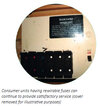Not seen the Welsh law yet, unlike the English law any reference material must be in English and Welsh so it can't refer to BS 7671 as only published in English.
But likely it will follow the same lines as the English law, and it will refer to other regulations for definitions. This is a problem, as the definition for the “consumer’s installation” which in the Electricity Safety Quality and continuity regulations 2002 means the electric lines situated upon the consumer’s side of the supply terminals together with any equipment permanently connected or intended to be permanently connected thereto on that side; does not match up with
Electrical installation (abbr: installation). An assembly of associated electrical equipment having co-ordinated characteristics to fulfil Specific purposes. as used with BS 7671 which means an EICR following the IET format does not cover the items asked for in the English law. Hence.
The Rental Sector inspection system is not fit for purpose.
For any premises does not need to be domestic, inspection and testing is split up, we have the DNO who supply the electric who look after the supply meter, fuses etc, and fit seals. The we have the installation, which is in the main non current using equipment, odd bit out is the lights, then we have the inspection and testing of in service electrical equipment often referred to as PAT testing, for current using equipment, what can have items done by specialists for example central heating.
So every report with have what it includes, we can code for ease items LIM or FI which means limitation or further investigation really the same thing, but one is a fail with English system the other is not.
We can also code other items, years ago with had 1, 2, 3, and 4 with 4 being does not comply with current edition of wiring regulations for a new design. But the IET felt this was misleading so we add C to show new system so have C1 = Dangerous, C2 = Potentially Dangerous, and C3 = Improvement recommended. There is very little debate over C1, however 230 volt is potentially dangerous, so what falls into that category is up for debate, an inspector could decide not to use C2 and only code C1 and C3 and doing so breaks no laws or regulations. All he must do is list the faults, Pembrokeshire trading standards have successfully prosecuted an electrician for not listing faults, but to my knowledge there have been no prosecutions for using wrong code.
As with any new law it is for the courts to decide, and it is added to by case law. So we are lacking case law to clarify what is permitted.
So the big question is answered
“qualified person” means a person competent to undertake the inspection and testing required under regulation 3(1) and any further investigative or remedial work in accordance with the electrical safety standards;
this is rather open, it does not ask for some one who has passes a C&G 2391 exam, which is the exam for testing and inspecting, or to be a member of a scheme, and the schemes seem to authorise inspection and testing independent of the notification process. So I as a non scheme member could do the inspection and testing, I would not do it, as I don't have professional indemnity insurance which really one needs, don't want to sell my house if I get it wrong.
But the big question which is asked again and again is since BS 7671 is not retrospective, what should be listed as potentially dangerous, there is a difference between what should be morally done, and what is needed to be done, I would say all circuit RCD protection is morally required, but not so sure if needed for an EICR.
In the main we tend to pass the buck, and we read the electrical safety council best practice guide,
Number 4 which has changed over the years, it was not that long ago this

was included which said the old fuse box could still be used, now no longer shown.
But clearly in 1954 when my parents house was built, we felt that was OK, but the equipment we are using today has changed, an old version of the wiring regulations stated
(ix) Lighting fittings using filament lamps installed in a room having a non-conducting floor, mounted at such a height that they cannot readily be touched and are out of reach of earthed metal.
did not need earths, this was before 1966, but today we don't use filament lamps, so even with pre 1966 regulations we need earths running to every 230 volt lamp.
So could the old guy down the road who plays with radios (A radio ham) who has clearly passed an exam to allow him to do his hobby inspect the house and write a report which has legal standing, I really don't know, the same for the surveyor who writes out a home buyers report, mine had references to the state of the electrics. We all know that would not be in the sprite of the law, and would likely not satisfy a court, but what about my son, who works as an electrical engineer in a glass works, he has his C&G 2391, can he write out the report for his own house which he rents out?
So
@EFLImpudence is right, not fit for purpose, and your left trying to decide do I want some one who will list every fault as a C2 so correction means the home is super safe, or some one who codes them all as C3 so you spend less money.
However even before any EICR laws landlords have been taken to court and fined when people have been killed in the home they rented out, so in many ways the EICR protects the landlord, he/she can show they did their best to ensure the home was safe. Or in other words they can pass the buck, and have a get out of jail free card.





